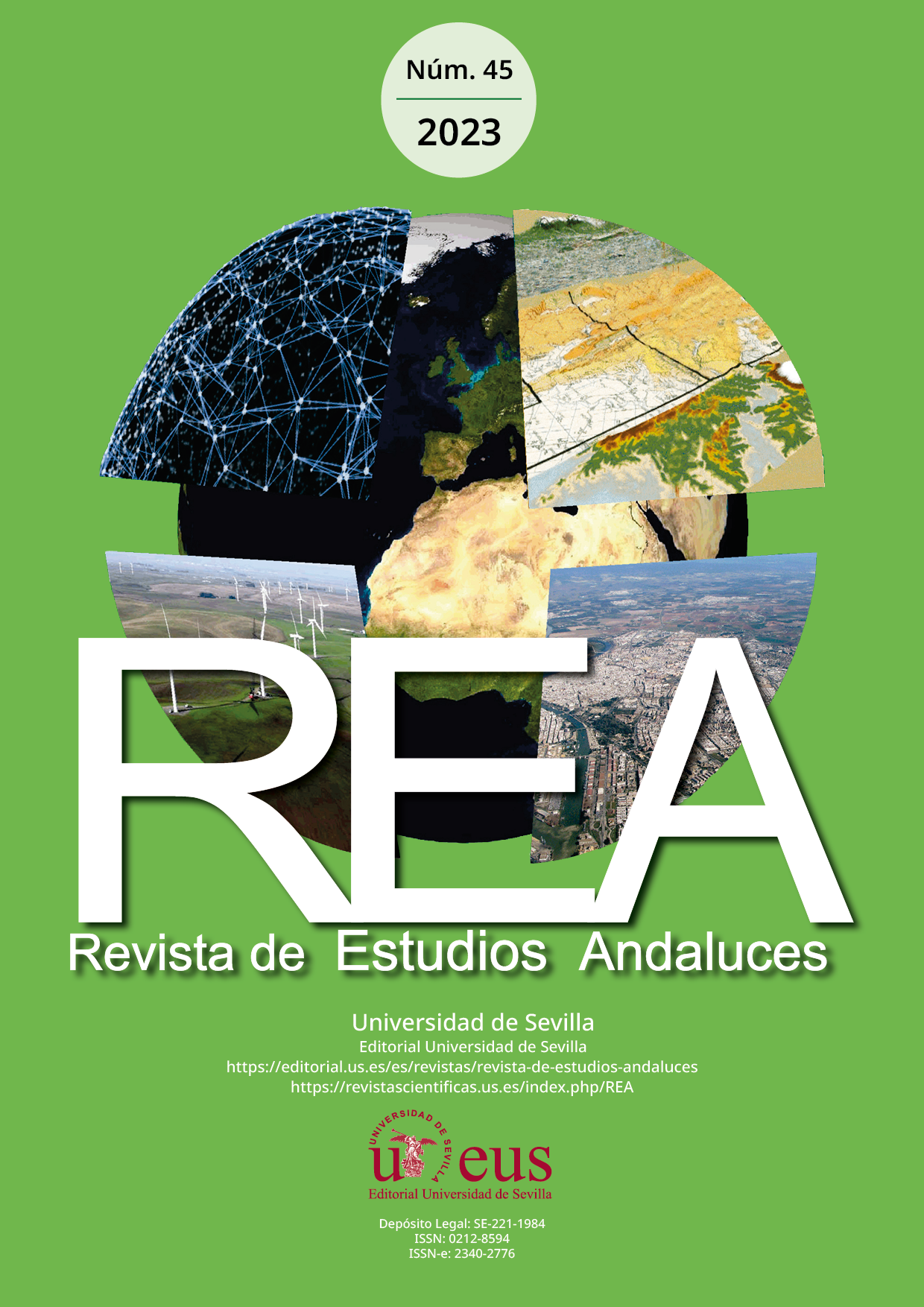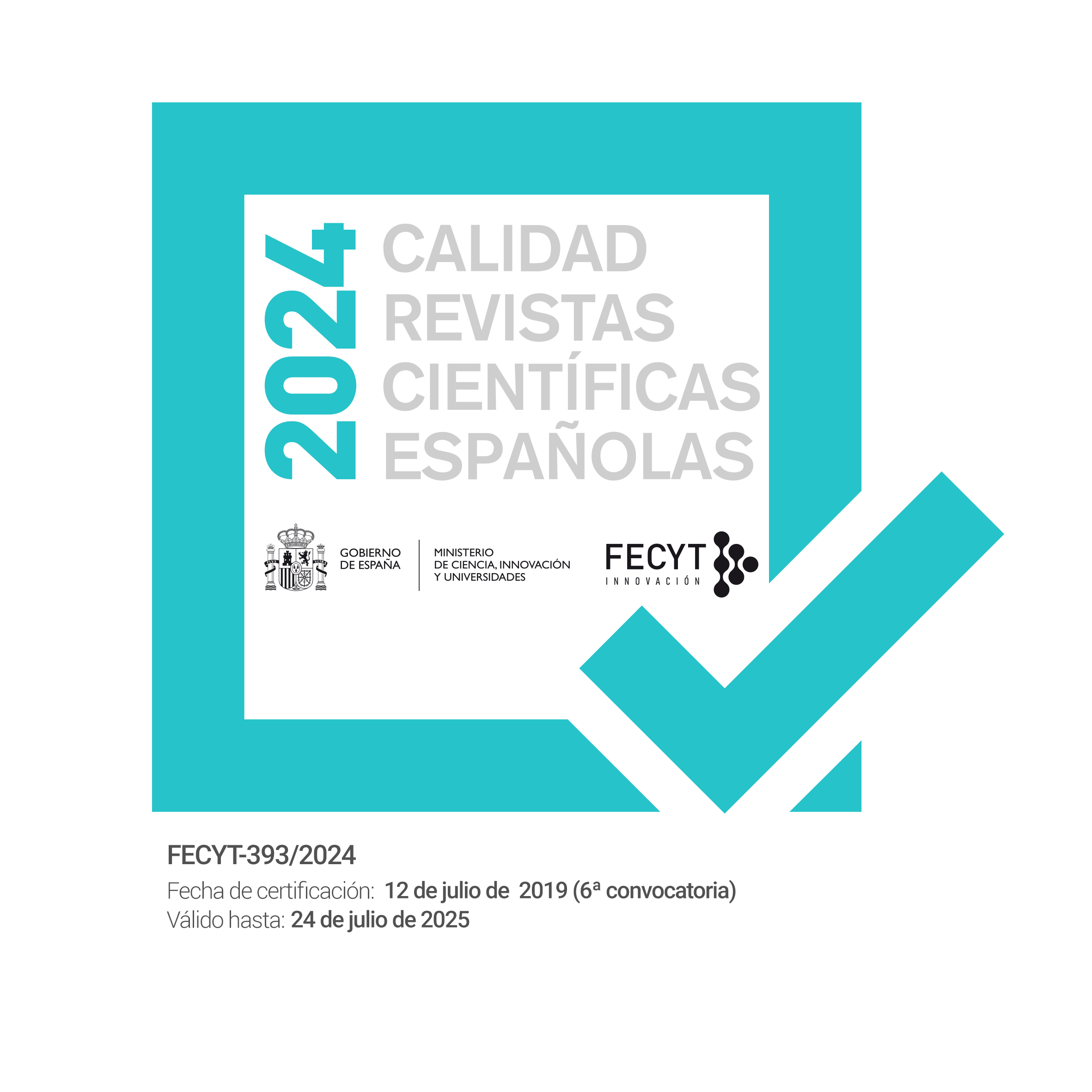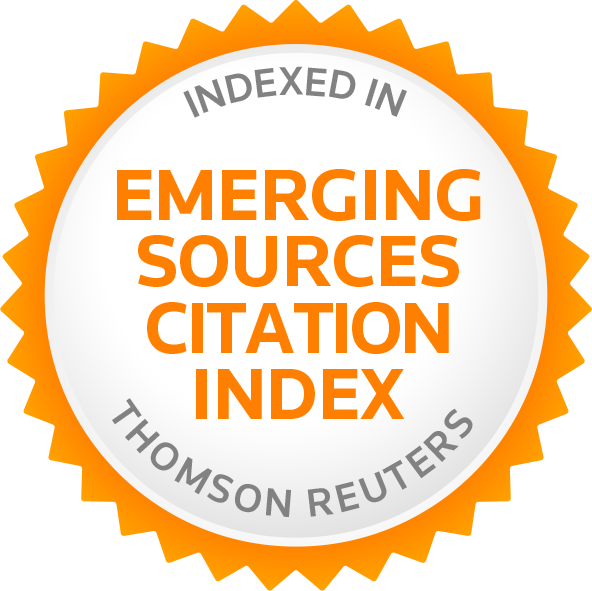Tourism promoting sustainable regional development: focusing on rural and creative tourism in low-density and remote regions
DOI:
https://doi.org/10.12795/rea.2023.i45.10Palabras clave:
Territorios periféricos, Planificación regional, Estrategias regionales, Estudios rurales, Turismo sostenibleResumen
Este estudio se sustenta sobre el análisis de la bibliografía existente, así como la valoración de un estudio de caso vinculado a un espacio con baja densidad de población y localización remota, ubicado en el Archipiélago de las Azores; para así tratar de identificar un nexo teórico, que relacione el turismo rural y creativo con el desarrollo regional sostenible, en el escenario post-COVID-19. Para ello, los autores han utilizado métodos de análisis descriptivos e inductivos/deductivos. A través de esta investigación se pretende no sólo profundizar en el estudio de esta temática, sino también identificar nuevas tendencias, enfoques y directrices rectoras que permitan a los actores implicados diseñar e impulsar un modelo de desarrollo regional sostenible a largo plazo. Los territorios remotos y de baja densidad poblacional son el destino más atractivo para este nuevo modelo de desarrollo turístico, fundamentado sobre estas tipologías turísticas (rural y creativa) de forma complementaria. Es por esto que mediante este estudio se muestra, cómo es posible impulsar un nuevo modelo de desarrollo turístico en un territorio ultraperiférico, como es el caso de la Región Autónoma Portuguesa de las Azores, en la cual el sector turístico ya tenía una relevancia significativa en 2019, contando con numerosos empresarios y actores turístico. Como resultado, algunas implicaciones potenciales para esta región pueden ser: (i) Mayores beneficios económicos: el turismo creativo puede aportar ingresos adicionales a las empresas y organizaciones locales y a los artistas y artesanos individuales; (ii) Preservación del patrimonio cultural: el turismo creativo puede contribuir a apoyar y preservar las prácticas culturales tradicionales y la artesanía, que pueden ser un aspecto esencial de la identidad de las comunidades insulares; (iii) Creación de empleo: el turismo creativo puede crear nuevas oportunidades de empleo para la población local, como guías turísticos, instructores de talleres y artistas.
Descargas
Citas
Abukhalifeh, A., Faller, E. Ahmad, A., & Tadros, S. (2017). Current Issue in tourism: diseases transformation as a potential risks for travellers. Global and Stochastic Analysis, 5(7)
Abellera, K., & Castanho, R.A. (2022). Analysis of the Sustainable Tourism Development in Indonesia. Thomson Reuters Aranzadi. Ed. pp. 371-380.
Amado, M. (2000). Planeamento Urbano Sustentável. Caleidoscópio.
Atik, M., Altan, T., & Artar, M. (2009) Land Use Changes in Relation to Coastal Tourism Developments in Turkish Mediterranean. Polish Journal of Environmental Studies, 19, 21-33.
Baixinho, A., Santos, C., Couto, G., Albergaria, I.S.d., Silva, L.S.d., Medeiros, P.D., & Simas, R.M.N. (2020). Creative Tourism on Islands: A Review of the Literature. Sustainability, 12, 10313. https://doi.org/10.3390/su122410313
Balaguer, J., & Jordá, M. (2010). Tourism as a long-run economic growth factor: The Spanish case. Applied Economics, 34(7), 877–884. https://doi.org/10.1080/00036840110058923
Behradfar, A., Castanho, R.A, Couto, G., Sousa, Á., & Pimentel, P. (2022). Analyzing COVID-19 Post-Pandemic Recovery Process in Azores Archipelago. Konuralp Medical Journal, 14(S1), 206-218. https://doi.org/10.18521/ktd.1051539
Bieldt, N. (2012). Building a Transformative Museum? Getting to “Our Place” through the Creative Industries Lens: A Case Study from New Zealand. In Danish Research Center on Education and Advanced Media Materials (Ed). The Transformative Museum, Proceedings of the DREAM (pp.1-14). Conference, Roskilde University, Denmar, 23–25 May 2012. Danish Research Center on Education and Advanced Media Materials, DREAM.
Blapp, M. & Mitas, O. (2019). The Role of Authenticity in Rural Creative Tourism. In N. Duxbury & G. Richards (Ed.) A Research Agenda for Creative Tourism (pp.28-40). Edward Elgar Publishing. https://doi.org/10.4337/9781788110723.00011
Bloom, D. E., & Cadarette, D. (2019). Infectious disease threats in the 21st century: strengthening the global response. Frontiers in Immunology. 10, 549. https://doi.org/10.3389/fimmu.2019.00549
Bluwstein, J. (2017). Creating ecotourism territories: Environmentalities in Tanzania’s community-based conservation. Geoforum, 83, 101-113. https://doi.org/10.1016/j.geoforum.2017.04.009
British Council (2021) Taipei Culture Foundation-Songshan Culture & Creative Park. Mapping Taiwan’s Creative Hubs: Searching for Taiwan’s Creative Context.
British Council (2021, December). Taipei, Taiwan, 2016. https://creativeconomy.britishcouncil.org/media/resources/Taiwan_Creative_Hub_Mapping_Report_Final_2016_B7z49nO.pdf
Bryden, J., & Bollman, R. (2005), Rural Employment in industrialized countries. Agricultural Economics, 22, 185–197. https://doi.org/10.1111/j.1574-0862.2000.tb00017.x
Brown, A., Ahmad, S., Beck, C., & Nguyen-Van-Tam, J. (2016). The roles of transportation and transportation hubs in the propagation of influenza and coronaviruses: a systematic review. Journal of Travel Medicine, 23(1). https://doi.org/10.1093/jtm/tav002
Burkle, F. M. (2006). Globalization and disasters: Issues of public health, state capacity and political action. Journal of International Affairs, 59(2), 231–265.
Cannonier, C., & Burke, M. (2019). The economic growth impact of tourism in small islands developing states—Evidence from the Caribbean. Tourism Economics, 25, 85–108. https://doi.org/10.1177/1354816618792792
Castanho, R. A. (2017). Sustainable Urban Planning in Transboundary Areas: Analysis of Critical Factors for Territorial Success. [Doctoral Thesis, University of Extremadura (UEx)]. Department of Vegetal Biology, Ecology and Earth Sciences. University of Extremadura (UEx).
Castanho, R.A. (2019). Identifying Processes of Smart Planning, Governance and Management in European Border Cities. Learning from City-to-City Cooperation (C2C). Sustainability, 11, 5476. https://doi.org/10.3390/su11195476
Castanho, R.A., Couto, G., Pimentel, P., Carvalho, C., Sousa, Á., & Garrido Velarde, J. (2020). Assessing the impacts of public policies over tourism in Azores Islands. A research based on tourists and residents perceptions. WSEAS Transactions on Environment and Development, 17, 19–20. https://doi.org/10.37394/232015.2020.16.77
Castanho, R.A., Couto, G., & Santos, R. (2021). Rural Tourism as a Catalyst for Sustainable Regional Development of Peripheral Territories. In R.A. Castanho (Ed.) Peripheral Territories, Tourism, and Regional Development. IntechOpen. https://doi.org/10.5772/intechopen.96651
Celik Omeraga, N., Ozrecberoglu, N., Yilmaz Genc, S., & Castanho, R. A., (2021). Covid-19 pandemic period reflections on problems experienced in distance education at the primary school level: teacher opinions. World Review of Science, Technology and Sustainable Development (WRSTSD). Special Issue on: CONCOVID 2020. The Global Economy, The Tourism Sector and Sustainable Development. https://doi.org/10.1504/WRSTSD.2021.10037379
Chiutsi, S., Mukoroverwa, M., Karigambe, P., & Mudzengi, B. K. (2011). The theory and practice of ecotourism is Southern Africa. Journal of Hospitality Management and Tourism, 2, 14-21.
Codosero Rodas, J., Castanho, R.A., Cabezas, J., & Naranjo Gómez, J. (2020). Sustainable valuation of land for development. Adding value with urban planning progress. A Spanish case study. Land Use Policy (2020) https://doi. org/10.1016/j.landusepol.2019.104456.
Cohen, E. (2020). Small Islands Tourism: A Review. Acta turistica, 32. 169-183. https://doi.org/10.22598/at/2020.32.2.169
Coria, J., & Calfucura, E. (2012). Ecotourism and the development of indigenous communities: The good, the bad, and the ugly. Ecological Economics, 73, 47-55. https://doi.org/10.1016/j.ecolecon.2011.10.024
Corrêa, J., Silveira, R., & Kist, R. (2019). Sobre o conceito de desenvolvimento regional: notas para debate. Revista Brasileira de Gestão e Desenvolvimento Regional, 15(7) (edição especial), 3- 15.
Couto, G., Pimentel, P., Ponte, J. C., Gonçalves, P., Duarte, D., Arruda, A.,... Rodrigues, F. (2018). Azores: Investor’s guide to sustainable tourism. Ponta Delgada: FLAD - Fundação Luso Americana para o Desenvolvimento.
Couto, G., Pimentel, P., Oliveira, A., Ponte Crispim, J., Santos, C., Estimaand, D., & Castanho, R.A. (2021). SmartDest: Converting the Azores Into a Smart Tourist Destination. In G. Couto, P. Pimentel, A. Oliveira, J. C. Ponte, C. Santos, D. Estima, & R. A. Castanho, Handbook of Research on Sustainable Development Goals, Climate Change, and Digitalization (pp. 409-432). https://doi.org/10.4018/978-1-7998-8482-8.ch025
Crăciun, A.M., Dezsi, Ș., Pop, F., & Cecilia, P. (2022). Rural Tourism—Viable Alternatives for Preserving Local Specificity and Sustainable Socio-Economic Development: Case Study—“Valley of the Kings” (Gurghiului Valley, Mureș County, Romania). Sustainability, 14, 16295. https://doi.org/10.3390/su142316295
Croes, R., & Rivera, M. (2017). Tourism’s potential to benefit the poor: A social accounting matrix model applied to Ecuador. Tourism. Economic, 23, 29–48. https://doi.org/10.5367/te.2015.0495
Dolinaj, D., Pašić, M., & Stojanović, V. (2009) Theoretical and practical approach of connecting the ecotourist offer of the special nature reserve of Zasavica: Serbia with the tourist offer of the surrounding village settlements. Turizam, 13(2), 92-101. https://doi.org/10.5937/Turizam0902092D
European Parliament (2021). European Parliament Resolution of 25 March 2021 on Establishing an EU Strategy for Sustainable. https://www.europarl.europa.eu/doceo/document/TA-9-2021-0109_EN.html
Fadahunsi, J.T. (2011). Application of Geographical Information System (GIS) Technology to Tourism Management in Ile-Ife, Osun State, Nigeria. Pacific Journal Science Technology, 12, 274–283.
Fauci, A. S., Morens, D. M. (2012). The perpetual challenge of infectious diseases. New England Journal of Medicine, 366(5), 454–461. https://doi.org/10.1056/NEJMra1108296
Fennell, D. (2008). Ecotourism (3rd ed.). Routledge. https://doi.org/10.4324/9780203939581
Fleischer, A., & Felsenstein, D. (2000). Support for rural tourism—Does it make a difference? Annals of Tourism Research, 27, 1007–1024. https://doi.org/10.1016/S0160-7383(99)00126-7
Garrido Velarde, J., Montero Parejo, M.J., Hernández Blanco, J., & García Moruno, L. (2018). Visual analysis of the height ratio between building and background vegetation. Two rural cases of study: Spain and Sweden. Sustainability, 10, 2593. https://doi.org/10.3390/su10082593
Giaccone, S.C., Galvagno, M., & Mauro, E.D. (2017). Competere Attraverso Il Turismo Creativo: Un’analisi Delle Preferenze Verso La Sicilia (Competing through Creative Tourism: An Analysis of Preferences towards Sicily). Sinergie Italian Journal of Management, 35. https://doi.org/10.7433/s103.2017.15
Gossling, S. (2002). Global environmental consequences of tourism. Global Environmental Change, 12(4), 283–302. https://doi.org/10.1016/S0959-3780(02)00044-4
Hall, C. M. (2006). Tourism, biodiversity and global environmental change. In S. Gossling & C. M. Hall (Eds.), Tourism and global environmental change: Ecological, economic, social and political interrelationships (pp. 142–156). Routledge. https://doi.org/10.4324/9780203011911
Honey, M. (2008). Ecotourism and sustainable development: who ones paradise? Island Press.
Hui, E. & Bao, H. (2013). The logic behind conflicts in land acquisition in contemporary China: A framework based upon game theory. Land Use Policy, 30, 373–380. https://doi.org/10.1016/j.landusepol.2012.04.001
Indah Mulyaningrum, N., & Hanifa Karismawandri, D. (2016). Travelling With Heart: Role of Wanderlust Indonesia as a Creative Travel Provider. In ICTGTD, Proceedings of the International Conference on Tourism, Gastronomy, and Tourist Destination. Djakarta, Indonesia, 14–15 November 2016. Atlantis Press.
Jiao, G., Lu, L., Chen, G., Huang, Z., Cirella, G.T., & Yang, X. (2021). Spatiotemporal Characteristics and Influencing Factors of Tourism Revenue in the Yangtze River Delta Urban Agglomeration Region during 2001–2019. Sustainability, 13, 3658. https://doi.org/10.3390/su13073658
Jorda-Capdevila, D., Brummer, M., Bruno, D., Castanho, R.A., Castro, A., Fortuño, P., Jakubínský, J., Kaletová, T., Kelemen, E., Koundouri, P., Logar, I., Loures, L., Mendes, J., Mendoza-Lera, C., Quintas-Soriano, C., Rodríguez-Lozano, P., von Schiller, D., Stubbington, R., Sykes, T., Tizzoni, E., Truchy, A., & Tsani, S. (2020). Ecosystem services and social perception. Chapter 5 in the Handbook: Intermittent rivers and ephemeral streams: what water managers need to know. Technical report – Cost ACTION CA 15113. http://doi.org/10.5281/zenodo.3888474
Kaletová, T., Castanho, R., Gallardo Martín, J., Loures, L., Cabezas, J., Fernández-Pozo, L. Naranjo Gómez, J., Lousada, S., Escórcio, P., Pinto-Gomes, C., & Raposo, M. (2019). Interactions between surrounding landscape biodiversity and temporal rivers: Ecosystem services in agricultural and natural landscapes in Mediterranean environments - Case Study of the Caia River. The International Congress on Sustainable Development, Public Management and Territorial Governance. WSB University (WSB). Dabrowa Górnicza, Poland.
Kiss, A. (2004). Is community-based ecotourism a good use of biodiversity conservation funds? Trends in Ecology and Evolution, 19, 232-237. https://doi.org/10.1016/j.tree.2004.03.010
Klauco, M., Weis, K., Stankov, U., Marković, V., & Arsenović, D. (2012). Ecological Significance of Land-Cover Based on Interpretation of Human-Tourism Impact. A Case from Two Different Protected Areas (Slovakia and Serbia). Carpathian Journal of Earth and Environmental Sciences 7(3), 231-246.
Koçak, E., Ulucak, R., & Şentürk Ulucak, Z. (2020). The impact of tourism developments on CO2 emissions: An advanced panel data estimation. Tourism Management Perspective, 33, 100611. https://doi.org/10.1016/j.tmp.2019.100611
Labrianidis, L., Ferrão. J., Hertzina, K., Kalantaridis, C., Piasecki, B., & Sma-llbone, D. (2003). The Future fd Europe’s rural periphery. Final Report. In 5th Framework Programme of the European Community.
Leíra, J. (2004). Políticas patrimoniales y planificación turística. In AA.VV. Turismo, ocio y deporte (pp.321-330). VIII Congreso Español de Sociología: transformaciones globales: confianza y riesgo, grupo: turismo, ocio y deporte. Alicante del 23 al 25 de septiembre.
Lima, F., & Silva, Y. (2017). ́Project Querença` and creative tourism: visibility and local development of a village in the rural Algarve. e-Review of Tourism Research (eRTR), 14(1-2), 21-35.
Loures L. (2015). Post-industrial landscapes as drivers for urban redevelopment: Public versus expert perspectives towards the benefits and barriers of the reuse of post-industrial sites in urban areas. Habitat International, 5(2), 72-81. https://doi.org/10.1016/j.habitatint.2014.06.028
Mahony, K., & Zyl, J. (2002). The Impacts of Tourism Investment on Rural Communities: Three Case Studies in South Africa. Development Southern Africa, 19, 83–103. https://doi.org/10.1080/03768350220123891
Marino, S. (2022). Developing a Sustainable Development Goals Research Hub among MERCOSUR’s Universities: A Case Study, Oppor Challenger Sustainable, 1(1), 2-12. https://doi.org/10.56578/ocs010102.
Marques Santos, A., Madrid, C., Haegeman, K., & Rainoldi, A. (2020). Behavioural changes in tourism in times of Covid-19. Publications Office of the European Union, Luxembourg. http://doi.org/10.2760/00411
Mazumder, H., Ahmed, M., & Al-Amin, Q. (2009). Estimating Total Contribution of Tourism to Malaysia Economy. International Journal of Business, Management and Social Sciences, 2, 146–159.
Matos Silva, F., Sousa, C., & Albuquerque, H. (2022). Analytical Model for the Development Strategy of a Low-Density Territory: The Montesinho Natural Park. Sustainability, 14, 4373. https://doi.org/10.3390/su14074373
McGarigal, K., & Marks, B. J. (1995). Spatial pattern analysis program for quantifying landscape structure. Gen. Tech. Rep. PNW-GTR-351. US Department of Agriculture, Forest Service, Pacific Northwest Research Station, 1-122. https://doi.org/10.2737/PNW-GTR-351
McKercher, B. (2018). The impact of distance on tourism: a tourism geography law. Tourism Geographies, 20(5), 905-909. https://doi.org/10.1080/14616688.2018.1434813
Mediano-Serrano, L. (2004). La gestión de marketing en el turismo rural. Pearson Prentice Hall.
Meller, P., & Marfán (1981). M. Small Large Industry: Employment generation, linkages, and key sectors. Economic Development and Cultural Change, 29, 263–274. https://doi.org/10.1086/451246
Mora Aliseda, J., Garrido Velarde, J., & Bedón Garzó, R. (2017). Indicators for Sustainable Management in the Yasuni National Park. Wseas Transactions on Business and Economics, 14.
Moral, M. F.-A.-F. (2019). Análisis del turismo rural y de la sostenibilidad de los alojamientos rurales. Revista Espacios, 40, 1.
Morais, J., Castanho, R., Pinto-Gomes, C., & Santos, P. (2018). Merging Traditional Livelihood Activities with New Employment Opportunities Brought by Ecotourism to Iona National Park, Angola: Rethinking Social Sustainability. In: AA.VV. Planeamiento Sectorial: Recursos Hídricos, Espacio Rural y Fronteras (pp. 293-303). Aranzadi, T.R.
Naidoo, P., & Sharpley, R. (2015). Local Perceptions of the Relative Contributions of Enclave Tourism and Agritourism to Community Well-Being: The Case of Mauritius. Journal of Destination Marketing & Management. https://doi.org/10.1016/j.jdmm.2015.11.002
OMT (2021). Concepto de Turismo Rural. https://www.unwto.org/es/turismo-rural.
Page, S., & Yeoman, I. (2007). How visit Scotland prepared for a flu pandemic. Journal of Business Continuity & Emergency Planning, 1(2), 167–182.
Peixeira Marques, C., Guedes, A., & Bento, R. (2022) Rural tourism recovery between two COVID-19 waves: the case of Portugal. Current Issues in Tourism, 25(6,) 857-863. https://doi.org/10.1080/13683500.2021.1910216
Posthumus, H., 2016, Applying multipliers in tourism, Case study. BEAM Exchange.
Pimenta, C., Ribeiro, J., & Remoaldo, P. (2021). Regional Development and Creative Tourism: A Bibliometric Survey of the Literature Available in Two Scientific Literature Databases. Revista Brasileira de Gestao e Desenvolvimento Regional, 17, 290-301. https://doi.org/10.54399/rbgdr.v17i2.6345
Polo-Peña, A. I. (2010). La orientación al mercado en el sector del turismo rural: Efectos en los resultados de la actividad empresarial y el valor percibido por el mercado [Tesis doctoral, Universidad de Granada]. Universidad de Granada.
Powell, L. A., Kazahe, U., & Kharuxab, R. (2017). Livestock farmers engage in ecotourism as a result of beliefs and attitudes toward wildlife on communal lands in Namibia. Human Dimensions of Wildlife, 22, 217-230. https://doi.org/10.1080/10871209.2017.1295490
Qiu, W., Chu C., Mao, A., & Wu, J. (2018) The Impacts on health, society, and economy of SARS and H7N9 outbreaks in China: a case comparison study. Journal of Environmental and Public Health. https://doi.org/10.1155/2018/2710185
Qureshi, A. (2016). Economic and political impact of ebola virus disease. In Ebola Virus Disease (pp. 177-191). Academic Press. https://doi.org/10.1016/B978-0-12- 804230-4.00013-3.
Raposo, M., Castanho, R., Meireles, C., Santos, P., & Pinto-Gomes, C. (2018). Border Effect on Flora and Raptors Diversity. An Iberian Case. In Ordenación del Espacio: Ciudades Inteligentes, Turismo y Logística (pp. 293-303). Thomson Reuteurs Aranzadi.
Rodríguez-Serrano, I., Caldés, N., De La Rúa, C., Lechón, Y., & Garrido, A. (2017). Using the Framework for Integrated Sustainability Assessment (FISA) to expand the Multiregional Input–Output analysis to account for the three pillars of sustainability. Environmental Development. Sustainable, 19, 1981–1997. https://doi.org/10.1007/s10668-016-9839-y
Reeder, R., & Brown, D. (2005). Recreation, Tourism, and Rural Well-Being. Economic Research Report Number 7. Department of Agriculture. United States.
Rebola, F., Loures, L., Ferreira, P., & Loures, A. (2022). Inland or Coastal: That’s the Question! Different Impacts of COVID-19 on the Tourism Sector in Portugal. Sustainability, 14, 16248. https://doi.org/10.3390/su142316248
Remoaldo, P., da Matos, O.P., Freitas, I., Lopes, H., Ribeiro, V., Gôja Carvalho, R., & Pereira, M. (2019). Good and Not-so-Good Practices in Creative Tourism Networks and Platforms: An International Review. In N. Duxbury, G. Richards, G. (Eds.) A Research Agenda for Creative Tourism (167-181). Edward Elgar Publishing. https://doi.org/10.4337/9781788110723.00024
Richards, G. (2018, December). Panorama of Creative Tourism around the World. Seminário Internacional de Turismo Criativo. Cais do Sertão, Recife-PE, Brazil.
Rytkönen, P., Bonow, M., & Dinnétz, P. (2014). Mountain agriculture at the crossroads, biodiversity, culture, and modernization, conflicting and interacting interests. In Farming Systems Facing Global Challenges: Capacities and Strategies. In T. Aenis, A. Knierim, M.C. Riecher, R. Ridder, H. Schobert, & H. Fischer (Eds.) IFSA Europe, Leibniz-Centre for Agricultural Landscape Research (ZALF) (pp. 893-904). Humboldt-Universität zu Berlin: Berlin, Germany. Proceedings of the 11th European IFSA (European Farming Systems Association) Symposion, Berlin, Germany, 1–4 April 2014.
Rytkönen, P., & Tunón, H. (2020). Summer Farmers, Diversification and Rural Tourism—Challenges and Opportunities in the Wake of the Entrepreneurial Turn in Swedish Policies (1991–2019). Sustainability, 12, 5217. https://doi.org/10.3390/su12125217
Rosselló, J., Santana-Gallego, M., & Awan, W. (2017). Infectious disease risk and international tourism demand, Health Policy and Planning, 32(4), 538–548, https://doi.org/10.1093/heapol/czw177
Santos, R. (2013). O regresso dos emigrantes Portugueses e o desenvolvimento do turismo em Portugal. [Ph.D. Thesis, University of Aveiro]. University of Aveiro Aveiro, Portugal.
Santos, C., Castanho, R.A., & Couto, G. (2023). Understanding Creative Tourism as a Potential Catalyst for Regional Economic Development in Ultra-Peripheral Territories: Highlighting Pilot-Projects in the Azores Islands. WSEAS Transactions on Business and Economics, 28, 295-306. http://doi.org/10.37394/23207.2023.20.
Santos, E., Moreira, J., Castanho, R.A, & Santos, E. (2023). Promoting Social Innovation Projects with an Online Course: Creating Global Solutions for Sustainability. In A. Mesquita, A. Abreu, J-V. Carvalho, & C. H.Pinto de Mello (Eds.) Perspectives and Trends in Education and Technology (pp. 109–118). https://doi.org/10.1007/978-981-19-6585-2_10
Santos, C., Couto, G., Soares de Albergaria, I., Sampaio da Silva, L., Damião Medeiros, P., Maria Neves Simas., R., & Castanho, R.A., (2022). Analyzing Pilot. Projects of Creative Tourism in an Ultra-Peripheral Region: Which Guidelines Can be Extracted for Sustainable Regional Development? Sustainability, 14, 12787. https://doi.org/10.3390/su141912787
Scott, N., & Laws, E. Stimulants and inhibitors in the development of niche markets-The whale’ stale. In Proceedings of the CAUTHE 2004, Brisbane, Australia, 9–12 February 2004.
Scott, D., & Gosssling, S. (2015). What could the next 40 years hold for global tourism? Tourism Recreation Research, 40(3), 269–285. https://doi.org/10.1080/02508281.2015.1075739
Sharpley, R., & Vass, A. (2006), Tourism, Farming and Diversification: An Attitudinal Study. Tourism Management, 27, 1040-1052. https://doi.org/10.1016/j.tourman.2005.10.025
Silva, F., & Lopes, T. 2020. Application of smart tourism to nature-based destinations. In L. Carvalho, L. Calisto, & N. Gustavo (Eds.), Strategic business models to support demand, supply, and destination management in the tourism and hospitality (1-20). IGI Global. https://doi.org/10.4018/978-1-5225-9936-4.ch001
Sousa, À., Castanho, R. A., Couto, G., & Pimentel, P. (2022). Pos-Covid Tourism Planning: Based on the Azores Residents’ Perceptions About the Development of Regional Tourism. European Planning Studies. https://doi.org/10.1080/09654313.2022.2079375
Spenceley, A (2001). Local community benefit systems at two nature-based tourism operations in South Africa. UNEP Industry and Environment July – December, 50-53.
Spenceley, A., Rylance, A., Nanabhay, S., & van der Watt, H. (2016). Operational Guidelines for Community-based Tourism in South Africa. Department of Tourism: Republic of South Africa.
Solsona-Monzones, J. (2006). El turismo rural en Europa. Aportes y Transferencia, 10(2), 25-35.
Stipanovic, C., & Rudan, E.(2014). Development Concept and Strategy for Creative Tourism of the Kvarner Destination [Croatia]. In Tourism and Hospitality Industry (pp. 507-517). 2014—Congress Proceedings; Faculty of Tourism and Hospitality Management: Opatija, Croatia.
Stephen, P. Potential Economic contribution of regional tourism development in China: A comparative analysis. International Journal Tourism Research, 17, 303–312. https://doi.org/10.1002/jtr.1990
Tao, T.C.H., & Wall, G. (2009). Tourism as a sustainable livelihood strategy. Tourism Management, 30, 90–98. https://doi.org/10.1016/j.tourman.2008.03.009
Tiago, F., Oliveira, C., Brochado, A., & Moro, S., (2020). Mapping Island Tourism Research. https://doi.org/10.1007/978-3-030-36126-6_9
Tichaawa, T. M. & Mhlanga O. (2015). Community perceptions of a community-based tourism project: A case study of the CAMPFIRE programme in Zimbabwe. African Journal for Physical, Health Education, Recreation and Dance (AJPHERD), Supplement 1, 55-67.
Trivic, Z., Tan, B.K., Mascarenhas, N., & Duong, Q. (2020). Capacities and Impacts of Community Arts and Culture Initiatives in Singapore. Journal Arts Management Law and Society, 50, 85–114. https://doi.org/10.1080/10632921.2020.1720877
Ulucak, R., Yücel, A.G., & İlkay, S.Ç. (2020). Dynamics of tourism demand in Turkey: Panel data analysis using gravity model. Tourism Economics, 26, 1394–1414. https://doi.org/10.1177/1354816620901956.
United Nations (2015). SIDS in Numbers 2015. United Nations: Office of the High Representative for the Least Developed Countries, Landlocked Developing Countries and Small Island Developing States (UN-OHRLLS).
Vargas-Sánchez, A. (2017). Territórios de inovação e turismo. In Silva F., Umbelino J. (Coord.), Planeamento e Desenvolvimento Turístico (pp. 481-492). Lidel.
Vargues, P., &Loures, L. (2008). Using Geographic Information Systems in Visual and Aesthetic Analysis: The case study of a golf course in Algarve. WSEAS Transactions Environmet Development, 4, 774-783
Van der Schyff, T. (2021). The Development and Testing of a Measurement Instrument for Regional Tourism Competitiveness Facilitating Economic Development [Doctoral Thesis, North-West University (NWU)]. North-West University (NWU).
Varisco, C. A. (2016). Turismo Rural: Propuesta metodológica para un enfoque sistémico. Revista de turismo y patrimonio cultural, (PASOS), 14(1), 153-167. https://doi.org/10.25145/j.pasos.2016.14.010
Vulevic, A. (2013). Infrastructural Corridors and Their Influence on Spatial Development—Example of Corridor VII in Serbia. Ph.D. [Thesis, Faculty of Geography, University of Belgrade]. University of Belgrade
Vulevic, A., Castanho, R.A., Naranjo Gómez, J.M., Cabezas, J., Fernández-Pozo, L., Garrido Velarde, J., Martín Gallardo, J., Lousada, S., & Loures, L. (2021). Common Regional Development Strategies on Iberian Territories. a Framework for Comprehensive Border Corridors Governance: Establishing Integrated Territorial Development. IntechOpen. http://doi.org/10.5772/intechopen.95617
Zhu, H., & Deng, F. (2020). How to Influence Rural Tourism Intention by Risk Knowledge during COVID-19 Containment in China: Mediating Role of Risk Perception and Attitude. International Journal Environmental Research and Public Health, 17, 3514. https://doi.org/10.3390/ijerph17103514
Walker, T., & Lee, T., & Li, X., (2021). Sustainable development for small island tourism: developing slow tourism in the Caribbean. Journal of Travel & Tourism Marketing, 38, 1-15. https://doi.org/10.1080/10548408.2020.1842289
Wang, X., Li, X., Zhen, F., & Zhang, J. (2016). How smart is your tourist attraction? Measuring tourist preferences of smart tourism attractions via a FCEM-AHP and IPA approach. Tourism Management, 54, 309-320.
Wen, J., Kozak, M., Yang, S., & Liu, F. (2020). COVID-19: Potential effects on Chinese citizens’ lifestyle and travel. Tourism. Review. https://doi.org/10.1108/TR-03-2020-0110
Williams, A. (1984). Introduction. In A. Williams (Ed.) Southern Europe Transformed-Political and Economic Change in Greece, Italy, Portugal and Spain (pp.1-32). Harper and Row.
Wunder, S. (2000). Ecotourism and economic incentives: An empirical approach. Ecological Economics, 32, 465-479. https://doi.org/10.1016/S0921-8009(99)00119-6
Yair Grinberger, A., Shoval, N., & McKercher, B., (2014) Typologies of tourists’ time–space consumption: a new approach using GPS data and GIS tools, Tourism Geographies, 16(1), 105-123. https://doi.org/10.1080/14616688.2013.869249
Yigitcanlar, T., Dur, F., & Dizdarogluc, D., (2015). Towards prosperous sustainable cities: A multiscalar urban sustainability assessment approach, Habitat International, 45(1), 36-46. https://doi.org/10.1016/j.habitatint.2014.06.033
Yu, A.T.W., Wu, Y., Shen, J., Zhang, X., Shen, L., & Shan, L. (2015). The key causes of urban-rural conflict in China. Habitat International, 49, 65–73. https://doi.org/10.1016/j.habitatint.2015.05.009
Descargas
Publicado
Cómo citar
Número
Sección
Licencia
Derechos de autor 2023 Revista de Estudios Andaluces

Esta obra está bajo una licencia internacional Creative Commons Atribución-NoComercial-CompartirIgual 4.0.
La edición electrónica de la Revista de Estudios Andaluces se ofrece en acceso abierto desde el número 28 publicado en 2011 hasta la actualidad. Las ediciones impresa y electrónica de esta Revista son editadas por la Editorial de la Universidad de Sevilla, siendo necesario citar la procedencia en cualquier reproducción parcial o total.
La Revista de Estudios Andaluces no cobra tasas por el envío de trabajos, ni tampoco cuotas por la publicación de sus artículos. La Revista es gratuita desde el momento de la publicación de cada número y sus contenidos se distribuyen con la licencia “CreativeCommons Atribución-NoComercial-SinDerivar 4.0 Internacional” , que permite al usuario de la Revista de Estudios Andaluces criterios que cumplen con la definición de open access de la Declaración de Budapest en favor del acceso abierto. Puede consultar desde aquí la versión informativa y el texto legal de la licencia. Esta circunstancia ha de hacerse constar expresamente de esta forma cuando sea necesario.







